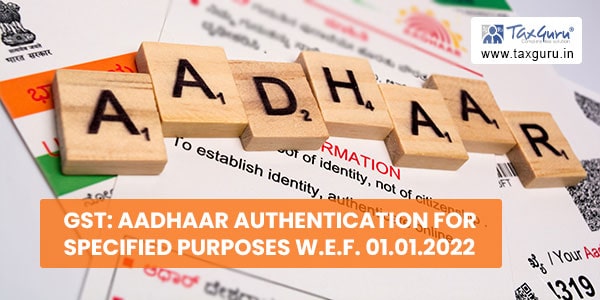Vide Notification No. 38/2021 – CT dt. 21.12.2021 read with Notification No. 35/2021 – CT dt. 24.09.2021 Aadhaar authentication shall be mandatory w.e.f. 01.01.2022 for specified purposes. Article explains Who has to undergo the Aadhaar Authentication, What are the purposes for which Aadhaar Authentication is mandatory, What if the Aadhaar number has not been assigned and Who is exempted from Aadhaar authentication for the specified purposes?
Page Contents
Who has to undergo the Aadhaar Authentication?
Every registered person shall undergo authentication of the Aadhaar number of the proprietor, in the case of proprietorship firm, or of any partner, in the case of a partnership firm, or of the karta, in the case of a Hindu undivided family, or of the Managing Director or any whole time Director, in the case of a company, or of any of the Members of the Managing Committee of an Association of persons or body of individuals or a Society, or of the Trustee in the Board of Trustees, in the case of a Trust and of the authorized signatory.
What are the purposes for which Aadhaar Authentication is mandatory?
The aforementioned persons have to mandatorily undergo Aadhaar Authentication for the following purposes:

a. filing of the application for revocation of cancellation of registration in FORM GST REG-21 under Rule 23,
b. filing of refund application in FORM RFD-01 under rule 89 (refund claims for seeking the refund of accumulated ITC on account of zero-rated supplies or inverted rate structure or refund claims on deemed exports or refund claims for excess cash balance),
c. refund under rule 96 of the integrated tax paid on goods exported out of India.
The taxable person, who have not yet authenticated their Aadhaar, may like to go through this authentication process before filing the above applications and enabling GST system to validate and transmit the IGST refund data from GST system to ICEGATE system.
Aadhaar authentication or e-KYC verification before filing of refund may be completed by navigating to “Dashboard > My Profile > Aadhaar Authentication Status.
What if the Aadhaar number has not been assigned?
If Aadhaar number has not been assigned to the concern person for Aadhaar authentication as specified above, such person may undergo e-KYC verification by furnishing the following:
(a) She/he will feed Aadhaar Enrolment ID and upload the acknowledgement; and
(b) She/he shall also upload any one of the following documents:
(i) Bank passbook with photograph; or
(ii) Voter identity card issued by the Election Commission of India; or
(iii) Passport; or
(iv) Driving license issued by the Licensing Authority under the Motor Vehicles Act, 1988 (59 of 1988)
Such person shall however undergo the authentication of the Aadhaar number within thirty days of the allotment of the Aadhaar number.
Who is exempted from Aadhaar authentication for the aforementioned purposes?
Following persons are exempted from the aforesaid requirement of Aadhaar authentication:
(a) not a citizen of India; or
(b) a Department or establishment of the Central Government or State Government; or
(c) a local authority; or
(d) a statutory body; or
(e) a Public Sector Undertaking; or
(f) a person applying for registration under the provisions of Section 25(9) of the Act (viz. any specialized agency of the United Nations Organisation or any Multilateral Financial Institution and Organisation notified under the United Nations (Privileges and Immunities) Act, 1947 (46 of 1947), Consulate or Embassy of foreign countries or any other persons as may be notified by the Commissioner).




